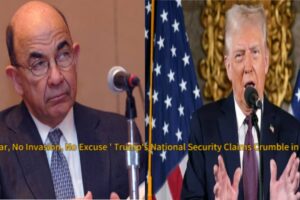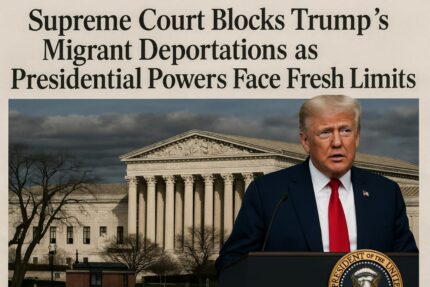The U.S. Supreme Court delivered a stunning early-hours order Saturday, temporarily blocking the Trump administration from deporting a group of Venezuelan detainees from the Bluebonnet Detention Center in Texas. The detainees, alleged members of the Tren de Aragua criminal gang, were facing imminent removal under the rarely-used Alien Enemies Act of 1798.
In its brief ruling, the Supreme Court directed the government to pause deportations “until further order of this court,” giving detainees a critical reprieve. Conservative justices Clarence Thomas and Samuel Alito dissented. The emergency intervention came after the American Civil Liberties Union (ACLU) filed a flurry of urgent appeals, arguing the detainees were not being afforded a fair opportunity to challenge their removals, as mandated by a prior Supreme Court decision earlier this month.
The Trump administration’s aggressive moves triggered panic among defense lawyers, particularly after reports surfaced that some detainees were already being loaded onto buses bound for deportation flights. The ACLU insisted the government’s actions violated detainees’ rights to habeas corpus relief — the ability to contest detention before removal.
Trump’s Use of Alien Enemies Act Sparks Outcry
President Donald Trump invoked the 1798 Alien Enemies Act, a centuries-old law allowing wartime deportations, to justify his plan to remove alleged gang members without the standard immigration court proceedings. The Act has rarely been used, with its most notable applications occurring during World War II against Japanese detainees.
Trump’s strategy reflects a broader push to expand presidential powers over immigration enforcement. Elected last year on a platform promising sweeping immigration crackdowns, Trump has moved swiftly to assert executive authority in deporting alleged criminals, labeling Tren de Aragua a terrorist organization.
Critics, however, argue the administration has failed to provide sufficient evidence linking the detainees to gang activity, raising constitutional concerns. Defense attorneys and Democratic lawmakers have demanded transparency, asking the White House to explain how membership in Tren de Aragua is being determined.
Judicial Tensions Escalate as Chief Justice Warns Trump
Saturday’s Supreme Court order follows mounting judicial tensions between Trump and the nation’s highest bench. Last month, Chief Justice John Roberts issued an extraordinary warning to Trump after the president publicly attacked Judge James Boasberg, who had earlier placed limits on deportations.
Trump’s threats of judicial impeachment, coupled with his administration’s rush to deport the Venezuelans, have prompted fresh worries about the erosion of judicial independence. In a parallel legal development on Friday, Judge Boasberg denied an ACLU request to immediately block deportations, citing the Supreme Court’s April 7 ruling allowing limited use of the Alien Enemies Act. However, Boasberg admitted deep concern that rapid deportations could occur before detainees had a real chance to challenge their removal.
Separately, a government lawyer acknowledged in court that while there were no “current” deportation plans, the Department of Homeland Security reserved the right to proceed at any time, further adding to the legal uncertainty.
ACLU Fights Urgently to Protect Detainees’ Rights
The ACLU mounted a multi-pronged legal offensive to halt the deportations, filing emergency motions across federal courts in Texas, New Orleans, and ultimately with the Supreme Court. Lawyers argued that the Trump administration was circumventing due process protections by attempting to deport individuals without giving them sufficient notice or access to legal remedies.
In a Friday court filing, the ACLU included a photo of a notice handed to one of the detainees, designating him an “Alien Enemy” subject to removal. The form, dated April 18, indicated the detainee had refused to sign it — a potential sign of objection to the rushed deportation process.
Lawyers urged that detainees should be granted at least 30 days to seek habeas corpus relief, but Trump officials have yet to publicly commit to any notice period. Without clear guidelines, advocates fear a wave of secretive deportations could unfold, undermining basic legal safeguards enshrined in U.S. law.
White House Defends Deportations as Political Battlelines Harden
The Trump administration has stood by its tough immigration stance, with the president telling reporters Friday that he supported the removals if the detainees were “bad people.” He added bluntly: “That’s why I was elected. A judge wasn’t elected.”
While Trump scored a narrow legal win when an appeals court blocked potential contempt charges against his administration, the broader battle over presidential immigration powers rages on. Democrats in Congress have vowed to investigate the administration’s use of the Alien Enemies Act, calling it a dangerous expansion of executive authority.
It remains unclear how many Venezuelans could ultimately be deported, or where they might be sent, with El Salvador’s notorious prison system a likely destination. As the legal fight continues, the Supreme Court’s intervention underscores the high-stakes constitutional clash over immigration, executive power, and due process rights in the United States.














